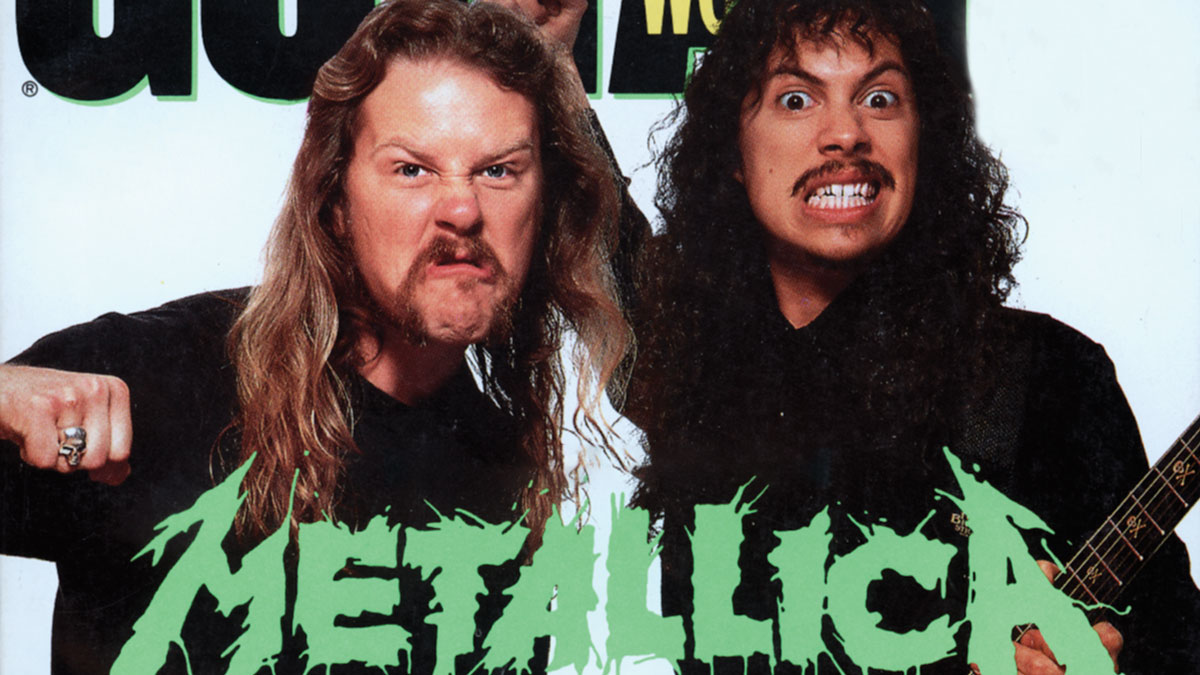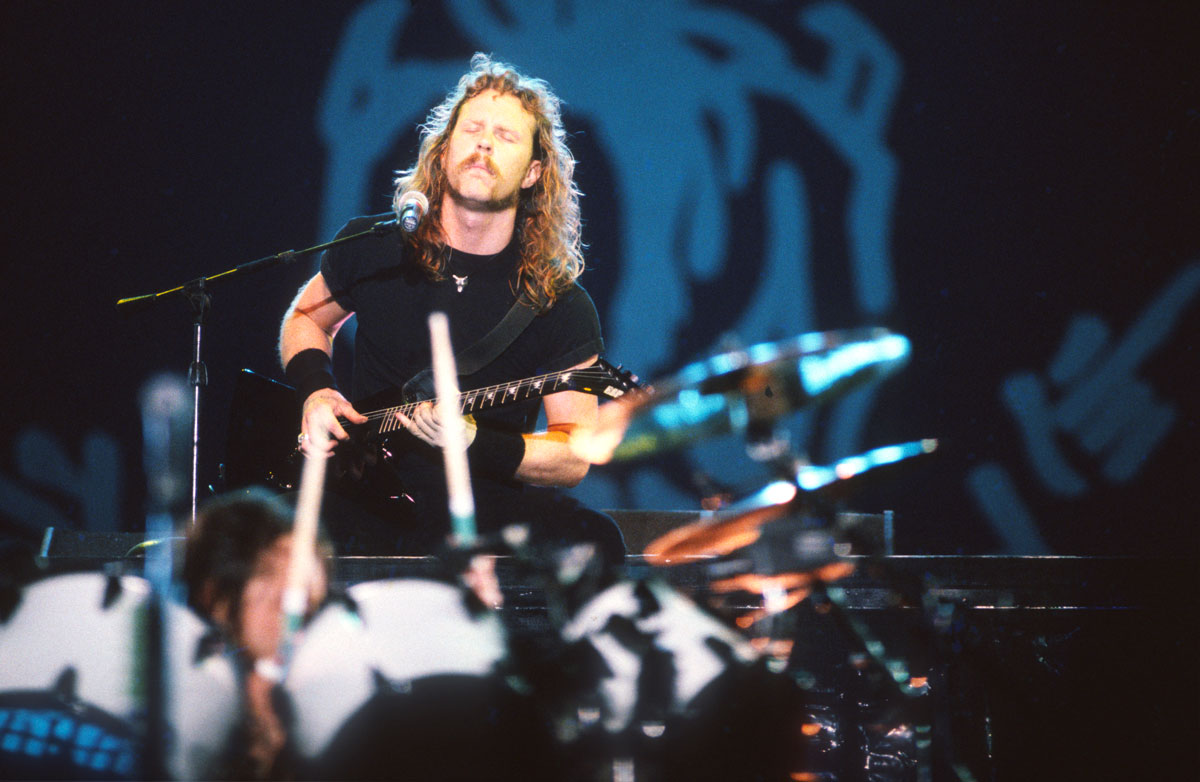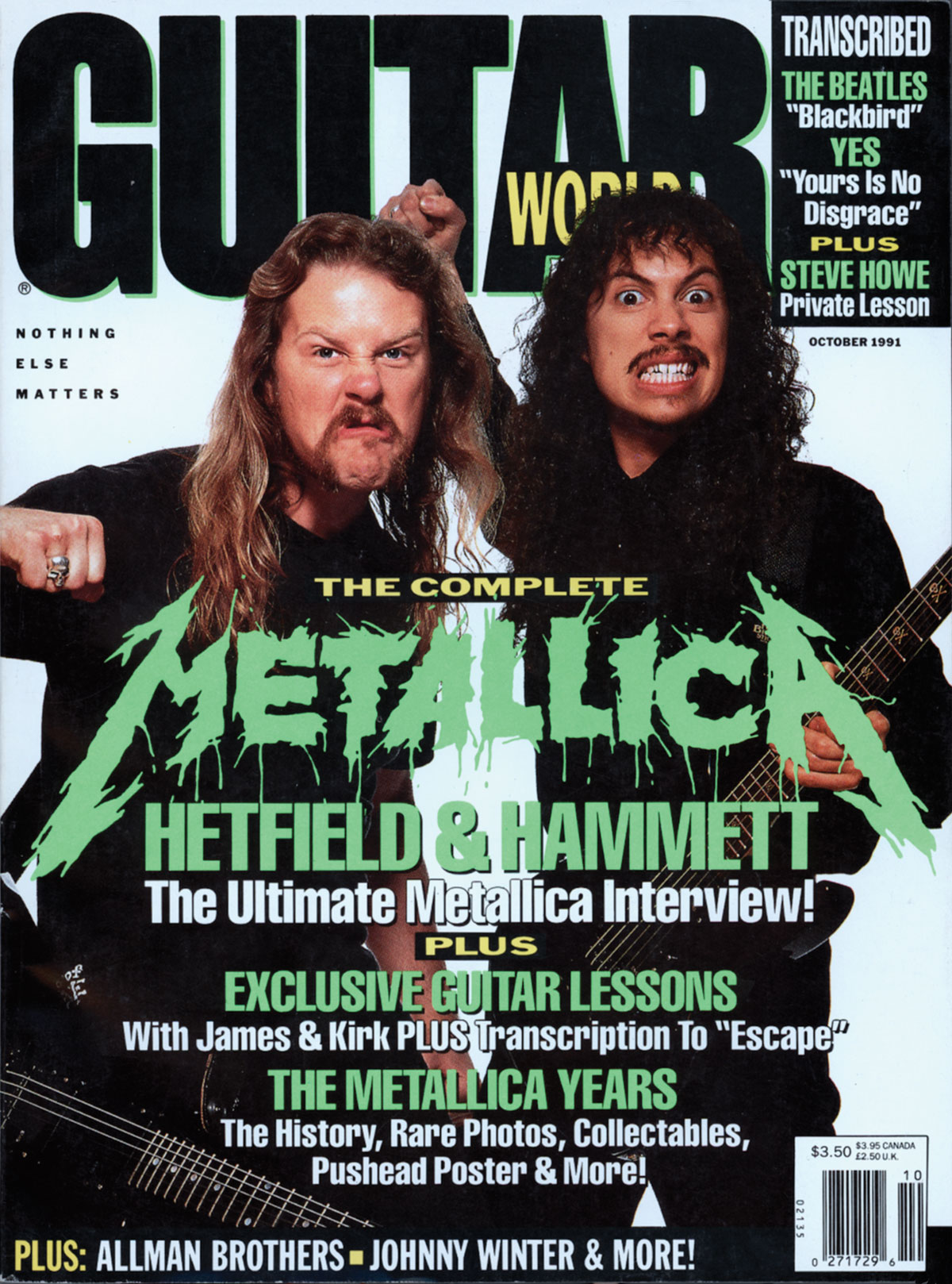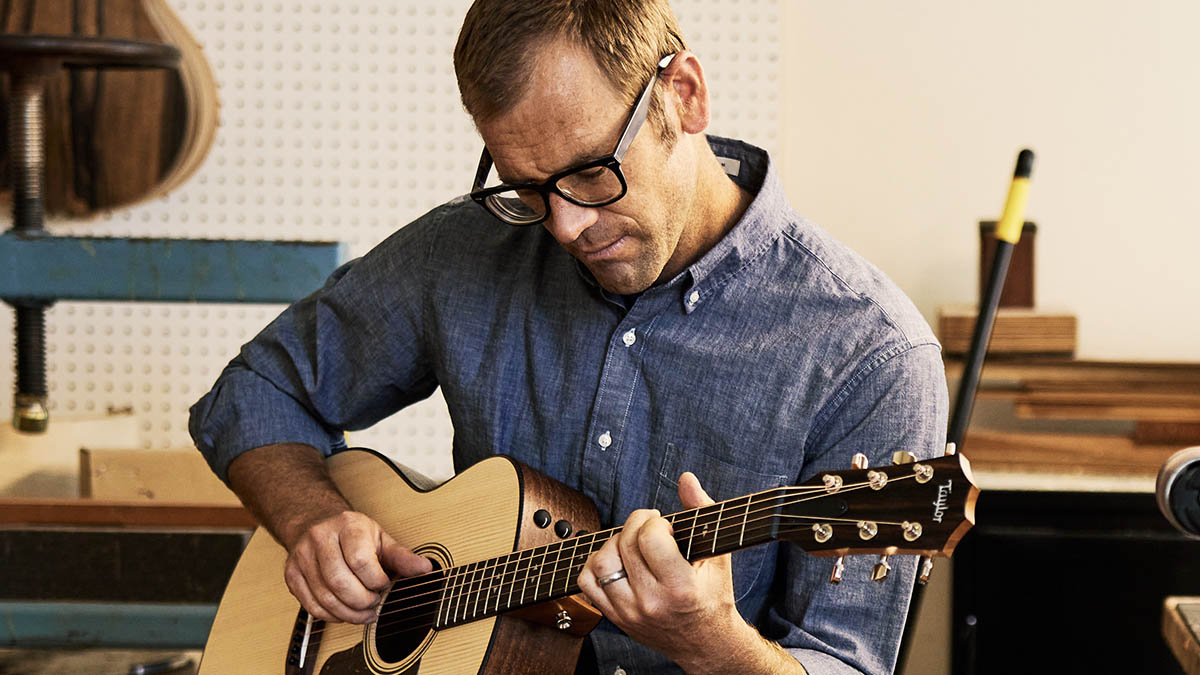Metallica's James Hetfield and Kirk Hammett reveal The Black Album's deepest, darkest secrets in this classic 1991 Guitar World interview
Shortly before their seminal self-titled LP went stratospheric, the metal titans tell all: arguing over guitar solos, shaking up their gear, fighting with Bob Rock, and the mystery behind ...And Justice For All's missing bass

This interview with Metallica's James Hetfield and Kirk Hammett is from the October 1991 issue of Guitar World.
“We’ve been in the studio so long – a war has come and gone, and we're still stuck in here!” A heavy weariness, quite evident behind James Hetfield's steely gaze, underscores the intense pressure that has been Metallica's constant as they labored over the past few months to record Metallica, their first album in over three years, and fifth overall.
"It's pretty amazing when you think about it," offers James with a strained smile. Here in the comfortable confines of One on One Studios in North Hollywood, it's down to the eleventh hour for the World's Greatest Metal Band.
Working exhaustively around the clock with producer Bob Rock, James and Kirk Hammett take turns spit-polishing a guitar solo here, roughing out a vocal there.
While this modern recording facility is outfitted with pool tables, weights, a well-stocked kitchen, dart boards, big screen TVs and videos, exercise machines and just about any creature comfort a healthy (or otherwise) rock group could ever want, it has been a veritable Devil's Island for the group.
“We've been in the studio so long,” growls James, “we've seen four other bands come through and do their albums. And some of those guys have already gone on tour!”
Outside, a small group of roving Metallica fans, hoping to catch a glimpse of James or Kirk entering (but never, seemingly, leaving) the white, windowless stucco building, maintain a tireless vigil, shuffling up and down the 5200 block of Lankershim Boulevard. Their nervous, darting eyes and untucked Metallica shirts have some local business proprietors double-checking their wares and wallets.
All the latest guitar news, interviews, lessons, reviews, deals and more, direct to your inbox!
“This has been going on since last October, once them kids found out this heavy metal band was next door," says a leathery-looking taco vendor a block away. “They don't scare me none, though.”
![[L-R] James Hetfield and Kirk Hammett of Metallica](https://cdn.mos.cms.futurecdn.net/uu3dgQLCztmAdV2LkHe8Ti.jpg)
As if on cue, a few fans wander in and order some burritos, heavy on the grease. Bob Rock is screaming. His voice penetrates the bank-vault thickness of the studio doors, almost reaching the street outside.
The platinum producer is at the hair-pulling stage, after spending the past five-and-a-half hours trying to correct a single, renegade guitar note that, to his million-dollar ears, is a microscopic tone out of whack. “He's not having a good day,” suggests Kirk with a sheepish grin.
The guitarist is repeatedly called in to try to punch in a note that will allow the visibly stressed Canadian producer to finally wrap up the tedious session. Kirk excuses himself, runs into the studio's main room, shoulders a black ESP and effortlessly runs through the solo for the twentieth time. “I think I got it,” he says.
It's no small wonder that Bob Rock – the career-rescuing hit-maker for artists like Mötley Crüe, Aerosmith, The Cult and Bon Jovi – is concerned over something as seemingly trivial as a single guitar note.
Taking on the Metallica project was a critical step in his otherwise Top 40-oriented career. “People will be saying Bob made Metallica sound like Bon Jovi,” remarks James. “They don't realize that no-one screws with us, except us. Bob fit right into the program and the direction we were going.”
Certainly, Rock's commercially successful background has raised more than a few eyebrows. The notion of Metallica opting for the producer's trademark approach – crisp, clear guitars and radio-friendly hooks – severely traumatized Metallica fans who drink in sledgehammer chords like they are mother's milk.
“We're not really out to justify what we're doing,” says James defensively. “We don't give a shit. This is what we want and this is how it is. Bob just helped us get what we want.”
What they wanted for Metallica, and what they got were guitars that ring more sharply than ever, leaving a clean trail of resonating destruction. Where ...And Justice For All was weak and flat-sounding in the bass and drum mix, the new album bursts with a deep snare crack and a bass thick and heavy enough to set cement with.
The band's whiplash tempo changes and complicated arrangements have been revamped into a lethal and immensely heavy, groove-laden sound and album that should give thrash a sharp kick in its sluggish ass. “Kirk!” Rock's screams are getting louder. “Uh, oh,” says Hammett, jumping like a dog about to be punished for knocking over the garbage can. “Got to go.”
Your patented "Metalli-crunch" seems bigger and badder on the new album. What did you do to fatten your sound?
Kirk Hammett: “First, I went through my CD collection and picked out guitar sounds that impressed me, and gave them to Bob Rock as points of reference. It helps to know what kind of tone you're trying to pursue.”
What CDs did you give him?
Hammett: “I was particularly impressed with Gary Moore's sound on his latest album, Still Got The Blues. I used one of the breaks from Oh Pretty Woman as a main reference. I also gave Bob UFO's Obsession – I've always liked Michael Schenker's sound.
“The third example was something by Carlos Santana. I was shooting for a real up-front sounding guitar.”
But wasn't that the problem with ...And Justice For All? The guitar was so up-front that it obscured Jason's bass.
James Hetfield: “The bass was obscured for two reasons. First, on past albums, Jason tended to double my rhythm guitar parts, so it was hard to tell where my guitar started and his bass left off.
“Also, my tone on Justice was very scooped -- all lows and highs with very little mid-range. When my rhythm parts were placed in the mix, my guitar sound ate up all the lower frequencies. Jason and I were always battling for the same space in the mix.
“On this album, Jason approached his parts differently. He's playing more with Lars's kick drum, so his basslines are very distinct from my guitar lines – we're not getting in each other's way. Bob really helped us with orchestrating and bringing out the low end – getting the guitar and bass to work together.
“In fact, when I played the album for a friend, he asked, ‘What is that weird low-end sound?’ I said, ‘That's something new for us – it's called bass!’”
Midrange has always been a no-no for me, but Bob showed me that having a touch of it in there really adds to your tone
James Hetfield
Did Bob understand the Metallica guitar sound?
Hetfield: “Oh yeah, and he actually added to it. After we recorded some of the new album, we pulled out the actual master tapes from Justice and singled out the guitar sound. I discovered something that I already knew – that my Justice sound lacked body.
“As I mentioned earlier, midrange has always been a no-no for me, but Bob showed me that having a touch of it in there really adds to your tone. I think he was a little intimidated at the start, because he wasn't sure how far he could push us.
“Bob was trying to be real professional, so we had to loosen him up. He was really polite at first, and would say things like, ‘It's your album, do whatever you want, and, ‘It's only my opinion, but how about if we try this?’ [Laughs]
“However, seven months in the studio with Metallica tends to change a man. And Bob's been changed. [Laughs] He's got a few more gray hairs, a few more wrinkles, he grew a tumor and has some sore knuckles from hitting the studio walls.”
Hammett: “Yeah, he really loosened up! In no time he was screaming and yelling and saying stuff like, ‘You have to get angry for this part – play it really mean and dirty!’ Then we'd record another part and he'd say, ‘Be bluesy and bendy.’ And to illustrate his point, Bob would move his shoulders all around. I'd just stare at him like he was a madman, thinking, ‘Uh, well, okay.’
![[L-R] Kirk Hammett and James Hetfield of Metallica](https://cdn.mos.cms.futurecdn.net/p9ibzt4Bcr4kAc2WfZSTRb.jpg)
“But his approach eventually worked. I really started focusing on what he was trying to say. He encouraged me to think conceptually, and not with my fingers. I thought a lot about what I felt would be the best way to approach the solo from a mental standpoint. As a result, my solos turned out smoother, and more confidently executed.”
Were you ever afraid that Bob was going to turn you into a pop band?
Hetfield: “Some people thought Bob would make us sound too commercial. You know, ‘Oh, Bob works with Bon Jovi, Bob works with Mötley Crüe.’ But if [former Metallica producer] Flemming Rasmussen worked on a Bon Jovi record, would Bon Jovi all of a sudden sound like Metallica?
“We chose Bob because we were really impressed with his crisp, full-sounding production on The Cult's Electric album and on Mötley Crüe's Dr. Feelgood.”
Hammett: “We wanted to create a different record and offer something new to our audience. I hate it when bands stop taking chances. A lot of bands put out the same record three or four times, and we didn't want to fall into that rut.
“The truth is, in the past, we may have been guilty of putting out the same running order – you know, start out with a fast song, then the title track, then a ballad.
I wasn't about to play a rhythm part through a fucking Fender or Supro amp, you know? We sure as hell weren't making Led Zeppelin I
James Hetfield
“Other than that, though, we've really tried to create something different every time we went into the studio. And on Metallica, we made a conscious effort to alter and expand the band's basic elements.”
Did you experiment with different amps and cabinets?
Hetfield: “We tried a bunch of amps, but I ended up using the same Mesa/Boogie Simulclass Mark II that I've used on the last three albums. In Los Angeles there are a million amps you can try out, but none of them were up to snuff.
“Bob also brought in a bunch of crappy-looking vintage amps. We gave everything a shot and ended up with the same old shit. [Laughs] I must admit, though, it was a lot of fun trying out all those little '60s and '70s amps – they really sounded unique.
“A lot of metal players have forgotten that they can be useful. We used a couple of vintage amps for texture. But I wasn't about to play a rhythm part through a fucking Fender or Supro amp, you know? We sure as hell weren't making Led Zeppelin I.”
Kirk, what did you use for amplification?
Hammett: “I used a Bradshaw preamp for the lows and mids, and a couple of Marshalls for the nice clean highs. We EQ'ed it through the board a little bit, and it worked out great.
“The mic'ing process was pretty simple. Bob had an engineer move a mic around in front of the cabinet until I heard the sound I wanted.”
Is your studio setup the same as your live setup?
Hetfield: “My live sound does not work in the studio, which is a completely different animal. Every little thing is detrimental to the sound. And if someone moves a mic, you've lost it. It's pretty much a case of ‘lock the door and set up a police line.’”
What do you look for in an amplifier?
Hetfield: “A smooth, solid, round sound. Something that doesn't sound fake. You can always fiddle around with the EQ later. A lot of modern amps and preamps sound great when you're jamming by yourself, but don't hold up in a band situation. The sound isn't dense enough, and the lows and highs tend to get soaked up by the bass and cymbals.”
James, you also tried a variety of guitars, which seems a little out of character for you.
Hetfield: “My primary guitar was an ESP Explorer with EMG pickups, but I also used a Telecaster, a Gretsch White Falcon with a Bigsby and a Guild 12-string. I used the other guitars just for bits and pieces.”
Kirk, I understand you didn't use your '74 Gibson Flying V on this record. What was your primary axe?
Hammett: “I used two guitars – a Strat-style ESP with two EMG's and an '89 Gibson Les Paul Deluxe with two EMG's. The way I settled on those guitars is pretty funny.
“At the beginning of the recording process, I laid down one of my solos 15 times, using 15 different guitars. Then I listened to each track, and – without knowing which guitar was which – selected the tone that sounded the best. I finally narrowed it down to the ESP and the Les Paul.”
We had pretty much done the longer song format to death. We were only able to fit about 12 songs in a two-and-a-half hour show
And you nailed the solo perfectly each time?
Hammett: “Well, not exactly. [Laughs] Good enough to A/B them, though. It was kind of interesting to play all those different guitars. Bob brought in a lot of different guitars, too. He's a guitar player – or so he says. [Laughs]”
What happened to your black '74 Gibson Flying V?
Hammett: “I used that V on every album prior to this one, but the ESP just sounded a bit rounder. Also, I felt it was time for a change. I bought that V while working at a Burger King. I worked three months, just long enough to be able to afford it. As soon as I made $400 – enough money to buy the V – I quit.
“I don't even know how much it costs to buy a guitar these days – I haven't set foot in a guitar store in ages.”
The songs on the new album are shorter than usual.
Hetfield: “Metallica shorter – six minutes instead of 10.”
It should be easier to get some radio airplay.
Hetfield: “That was always a problem. We'd record a song that people liked and wanted to hear on the radio, and the radio bastards wouldn't play it because it was too long. Or they would want to edit it, which we wouldn't allow.
“But radio airplay wasn't the whole idea behind our writing shorter songs. It just seemed to us that we had pretty much done the longer song format to death. We were only able to fit about 12 songs in a two-and-a-half hour show. These shorter songs are going to help a bit – we're going to be able to play more of 'em. [Laughs]
“We have one song that has just two riffs in it, which is pretty amazing. It only takes two minutes to get the point across!”
Shorter songs mean shorter guitar solos.
Hammett: “In some instances.”
Also, the new album is less complex harmonically.
Hammett: “That's true. There are fewer key changes. There aren't many flatted fourth progressions, or anything like that – just straight-ahead major and minor keys. The most complex song is probably Wherever I May Roam, which suggests a Phrygian dominant scale.”
Metallica has acquired a reputation for being meticulous. How often do you return to and repair something you think could be improved?
Hammett: “I fix things all the time. Every time I do a solo, I re-check it and correct things that don't hit the mark.”
Lars doesn't mess with the guitar sound – just the bass guitar!
In doing so, do you ever get the feeling that your behavior is less musical than it is... anal retentive?
Hammett: “[Laughs] It's like this – you have to live with it. When you know you're going to be listening to a performance over 500 times, it's important to be happy with it. Believe me, there are mistakes on our other albums and I can't bring myself to listen to them. It's torture.”
Which cuts?
Hammett: “I'm not going to say! [Laughs] You have to pick them out yourself.”
What really stands out about Metallica is its feel.
Hetfield: “That's what we wanted – a live feel. In the past, Lars and I constructed the rhythm parts without Kirk and Jason, or Lars played to a click by himself. This time I wanted to try playing as a band unit in the studio. It lightens things up and you get more of a vibe. Everyone was in the same room and we were able to watch each other. That helped a lot, especially with some of the bass and lead stuff.
“It also helped that we'd played most of the songs for two months, even before we entered the studio. Unfortunately, Lars kind of pussied out at the end – he didn't want everyone there. I guess it's kind of difficult to work in the studio when you're not used to a new song, and there are all these people around.”
Lars is always very involved in the Metallica production process. What is his input with regards to the guitar sound?
Hetfield: “He doesn't mess with the guitar sound – just the bass guitar. [Laughs]! He can say whatever he wants, but I think he's pretty confident in my ability to know what's right as far as the guitar goes.”

While the songs on Metallica are less complex, the orchestration on this album is more sophisticated than your previous efforts.
Hammett: “That's right. I think the degree of subtlety may shock people. Bob's really good with sound, and we took advantage of it by using different guitars and more vocal harmonies. There are fewer guitar overdubs on this record, though.
“I used to layer 80 guitars in my attempt to create a heavy sound. But for one part of the composite, Bob would like another. Then I'd ask Lars and James one part of the composite, and Bob would like another. Then I'd ask Lars and James for their opinions, which only complicated things. [Laughs]. I usually ended up walking out of the room while everyone else fought it out.”
Were there any songs that didn't make it to the album?
Hetfield: “No. We went in and recorded 12. There are no other half-written songs sitting around anywhere. Whatever we wrote is there. It only takes one day of trying to write something to tell if it's going to end up in the dumper. [Laughs]
There is a lot more separation on this album, which also makes it sound punchier. With a pair of headphones, you can tell who's doing what
“I've discovered that sheer quantity doesn't necessarily make for a heavier sound; if anything, overdubs make guitars sound mushier. As far as rhythms go, there are either two or three tracks, and they're split pretty evenly.
“There is a lot more separation on this album, which also makes it sound punchier. With a pair of headphones, you can tell who's doing what.”
Kirk, The Unforgiven features an unusual solo. How did it evolve?
Hammett: “That was probably the most challenging solo on the album. I had something worked out before I got into the studio, but Bob felt it wasn't quite appropriate. He asked if I could try something dirtier and more sustaining -- something more in the vein of Jeff Beck.
“At first I was kind of hurt, but then I realized he was right. I started fingerpicking a chordal thing, and Bob liked the way it sounded. He said, ‘Why don't you play that entire guitar solo with your fingers, and really pull on the strings and slap them against the frets?’
“It was a cool idea. I did it and it sounded really percussive. That was the first time I fingerpicked a guitar solo on an album. That's a great example of a song that was a challenge, feel-wise.”
Did any of the songs challenge your harmonic capabilities?
Hammett: “Of Wolf And Man. It reminded me of some of the more progressive music on Justice. The rhythm parts jumped from a I chord to a bV chord – you know, that E to Bb thing – which always presents a problem.
“I was stumped at first, but after a while I just started singing various lines and adapting my vocal melodies for the guitar.
“I discovered that singing shakes down a lot of imaginary boundaries, and disrupts that tendency to gravitate towards familiar scales and finger patterns on the guitar.”
Does the band offer much input regarding your guitar solos?
Hammett: “When you're that close to a performance, you sometimes need an objective opinion, and it's good to ask the guys. But you know, I'll only change so much. [Laughs]
“They'll make suggestions, but they never tell me what to play. It's more like, ‘I'm going to play what I think feels good, and if you don't like it, you tell me, and maybe I'll change it.'
“We had a really big argument about a certain guitar solo. I thought one way and the guys thought another way. I said, ‘No, this is the way I want it to turn out.’ And that's the way we kept it. But it's good to have an objective opinion around, because it can lead to other areas and directions you didn't consider in the first place.”
Much of my playing is rhythmic and choppy; I use a lot of double stops. The wah just accents all those stops and chops and brings out the rhythmic aspect that much more
Kirk Hammett
For example?
Hammett: “The solo that really comes to mind is the one in The God That Failed. I had this whole thing worked out, and Bob said, ‘I don't know if that's going to make it – try something like this.’ And he half-sang, half-mumbled something. The only things really audible were the first three out of the eight or nine notes he was trying to sing.
“So I took those three notes and came up with a phrase that actually worked very, very well. Between his singing and my interpretation, we mapped out a solo that was a lot different than my original idea.”
James, why is it that you don't play any solos?
Hetfield: “I can't play leads. I can do really cool harmony shit, and on slow songs I can do bendy, feely-type shit, but my strength is in writing riffs. I just have a better feel for rhythm. I'll never be able to play fast like Kirk. I don't even try, 'cause he's the man. Some of his solo stuff on this new album is really good. He's using a lot of wah-wah lately, which everyone in the band really loves.”
Kirk, your use of the wah pedal has almost become your signature.
Hammett: “There's something about a wah pedal that really gets my gut going! People will probably say, ‘He's just hiding behind the wah.’ But that isn't the case. It's just that those frequencies really bring out a lot of aggression in my approach.
“Much of my playing is rhythmic and choppy; I use a lot of double stops. The wah just accents all those stops and chops and brings out the rhythmic aspect that much more.
“The only problem I've had with my Vox Wah is its tendency to move around on the floor. So now it sits on a rubber mat that says in big letters, ‘Kirk's Wah-Wah Rug.’ [Laughs]”

Your solos on this album seem much more fluid than those of the past. What's your secret?
Hammett: “We toured for a year-and-a-half before we recorded this album, and that really helped my playing a lot. I also started listening to different kinds of music, which helped broaden my perspective. For example, I've been experimenting with slide guitar.
“Additionally, I discovered a new recording process that really works for me. On Metallica I recorded six or seven different guitar solos for almost every song, took the best aspects of each solo, mapped out a master solo and made a composite.
“Then I learned how to play the composite solo, tightened it up and replayed it for the final version. The only bad thing about that process is that it led to a lot of arguments.”
Didn't being in the studio for so long drive you crazy?
Hetfield: “Yes, it did! [Laughs] Very much so. I don't remember doing anything else; I don't remember not living in the studio. I'm itching for people to hear this album because I'm sick of hearing it myself. That's the ultimate feeling – when someone hears your shit and says, ‘That's good!’ And I go, ‘I know, but it's good to hear you say it!’”





